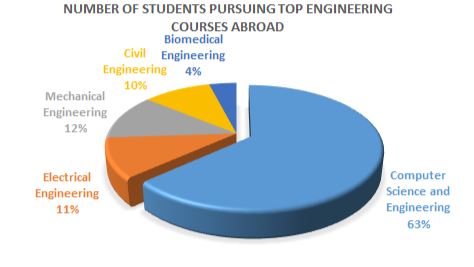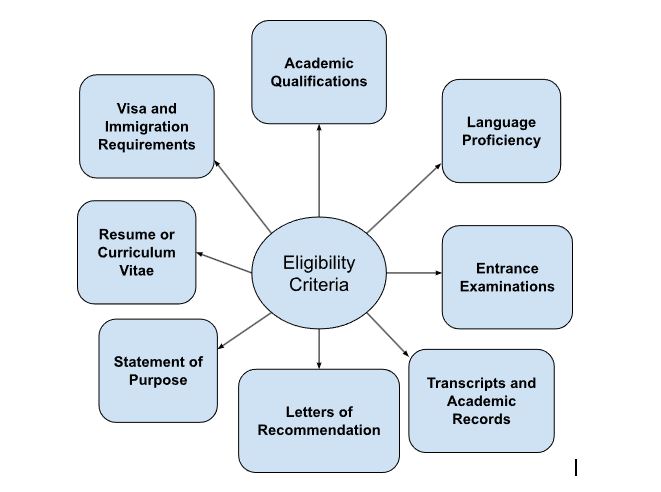Which engineering course is best for future?

 Choosing the “best” engineering course for the future depends on various factors including your interests, career goals, market demand, and technological advancements. To be a successful engineer one should have a broad understanding of responsibilities which includes problems, researching, interpreting and applying information. Here are several engineering fields that are projected to be promising in the future:
Choosing the “best” engineering course for the future depends on various factors including your interests, career goals, market demand, and technological advancements. To be a successful engineer one should have a broad understanding of responsibilities which includes problems, researching, interpreting and applying information. Here are several engineering fields that are projected to be promising in the future:
Best Engineering Courses for Future
- Computer Science and Engineering (CSE): With the continuous advancement of technology, computer science and engineering remain highly sought after. Fields within CSE such as artificial intelligence, machine learning, cybersecurity, and data science are particularly promising.
- Electrical Engineering (EE): As the world becomes more reliant on technology, electrical engineers will continue to play a crucial role in various industries including telecommunications, power systems, renewable energy, and electronics.
- Mechanical Engineering (ME): Mechanical engineers are needed in industries such as automotive, aerospace, manufacturing, and robotics. With the growing emphasis on sustainability and renewable energy, Mechanical engineering skills are increasingly valuable.
- Civil Engineering (CE): Civil engineers are essential for infrastructure development, including transportation systems, buildings, bridges, and environmental projects. With urbanization and population growth, the demand for civil engineers is expected to remain high.
- Biomedical Engineering (BME): This interdisciplinary field combines engineering principles with medical and biological sciences. With an aging population and advancements in healthcare technology, there is a growing demand for biomedical engineers in areas such as medical devices, tissue engineering, and healthcare systems.
- Environmental Engineering: With increasing concerns about environmental sustainability and climate change, environmental engineers are needed to develop solutions for pollution control, water resource management, and renewable energy.
Ultimately, the “best” engineering course for the future depends on your interests and strengths. It’s essential to research each field, consider your career goals, and evaluate the job market trends before making a decision. Additionally, staying updated with emerging technologies and industry trends will help you remain competitive in your chosen engineering field.
Advantages of Top Engineering field:
- Computer Science & Engineering: Computer Science & Engineering is highly versatile and applicable across various industries. In addition to this there is also a consistently high demand for professionals with computer science and engineering fields. Graduates in this field can easily work in fields such as cybersecurity, software development, artificial intelligence, data analytics and more.
- Electrical Engineering: Electrical engineering graduates can pursue careers in various industries such as telecommunications, power generation and distribution, electronics, aerospace, automotive and renewable sector. This definitely provides professionals with expertise in design, maintaining and improving the electrical system to ensure efficiency and reliability.
- Mechanical Engineering: Mechanical engineering is one of the most respected and applicable across a wide range of industries which includes automotive, aerospace, manufacturing, energy, robotics and more. Due to the specialized nature of mechanical engineering and the high demand for skilled professionals, careers in this field often come with competitive salaries and benefits packages.
- Civil Engineering: Civil engineers are responsible for designing and constructing essential infrastructure such as roads, bridges, airports, railways, dams, and buildings. With the growing economy of various developing countries the demand for civil engineers is also on the rise.
- Biomedical Engineering: Biomedical engineers are the front face of healthcare innovation. The biomedical engineers develop new medical devices, technologies and therapies that improve diagnosis, treatment and patient healthcare. Also, to develop cheap healthcare devices affordable for all people is also an important part of biomedical engineers. Biomedical engineering involves collaboration with professionals from various disciplines, including medicine, biology, chemistry, materials science, and computer science.
- Environmental Engineering: Environmental engineers play a crucial role in protecting the environment by developing strategies and technologies to minimize pollution, conserve natural resources, and mitigate environmental impacts. Their work helps safeguard ecosystems, wildlife habitats, and human health.

Top Universities Providing Engineering Courses
| University Name | Degree Name | Location |
| Arkansas State University | Master of Science in Engineering Management | Arkansas, USA |
| Saint Louis University | Master of Science in Engineering | Missouri |
| University of Arizona | Master of Science in Engineering Management | Tucson, Arizona |
| Murray State University | Master of Science in Engineering Management | Murray, Kentucky |
| The Catholic University of America | Master of Science in Engineering Management | Washington, D.C., United States |
| Wichita State University | Master of Engineering Management | Wichita, Kansas |
| XU Exponential University | Masters in mechanical Engineering | Potsdam, Germany |
| Technische Universität München (TUM) – Technical University of Munich | MSc in Mechanical Engineering | Munich, Germany |
| Technische Universität Berlin (TU Berlin) | M.Eng in Mechanical Engineering | Berlin, Germany |
| Concordia University St Pauls | MEng in Mechanical Engineering | Saint Paul, Minnesota |
Eligibility of Engineering course for international students
The eligibility criteria for engineering courses for international students in foreign universities can vary depending on the country, institution, and specific program. However, there are several common eligibility requirements that international students typically need to fulfill:

- Academic Qualification: Most engineering programs require applicants to have completed secondary education equivalent to the country’s high school diploma or its international equivalent. This typically includes a strong background in mathematics, physics, and chemistry.
- Language Proficiency: International students are often required to demonstrate proficiency in the language of instruction, usually English. This is typically assessed through standardized tests such as the TOEFL (Test of English as a Foreign Language) or IELTS (International English Language Testing System).
- Entrance Examinations: Some universities and countries may require international students to take standardized entrance examinations, such as the SAT (Scholastic Assessment Test) or ACT (American College Testing), in addition to meeting other eligibility criteria.
- Transcripts and Academic Records: Applicants are usually required to submit official transcripts and academic records from their secondary education institutions, detailing their academic performance and achievements.
- Letters of Recommendation: Many engineering programs require applicants to submit letters of recommendation from teachers, counselors, or other professionals who can attest to their academic abilities, character, and suitability for the program.
- Statement of Purpose or Personal Statement: Applicants may need to submit a statement of purpose or personal statement outlining their academic and career goals, reasons for choosing the engineering program, and how they intend to contribute to the field.
- Resume or Curriculum Vitae (CV): Some universities may request a resume or CV detailing the applicant’s academic and extracurricular achievements, work experience, volunteer activities, and other relevant information.
Conclusion
In conclusion, it is very important to select the most suitable engineering course for your future endeavors. The various factors to consider while making this decision include personal interests, career aspirations, market demand and technological advancements, etc. Success in the field of engineering necessitates a comprehensive understanding of responsibilities, including problem-solving, research, interpretation, and application of information.
Some of the prominent engineering fields that are projected to be promising in the future include Computer Science and Engineering (CSE), Electrical Engineering (EE), Mechanical Engineering (ME), Civil Engineering (CE), Biomedical Engineering (BME), and Environmental Engineering. Each of these disciplines offers unique opportunities for growth and impact, catering to different interests and strengths.
In addition to this, knowing the various advantages and disadvantages are also very important in choosing which engineering course is best for the future.
FAQ
Which field of engineering is best in the future?
The fields of engineering which are best in the future are computer science & engineering, electrical engineering, mechanical engineering, civil engineering, biomedical and environmental engineering.



